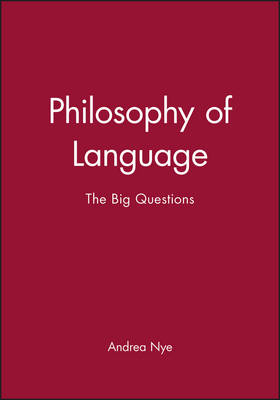
Philosophy of Language
Wiley-Blackwell (Verlag)
978-0-631-20602-6 (ISBN)
Andrea Nye is Professor of Philosophy at the University of Wisconsin-Whitewater. She is the author of Feminist Theory and the Philosophies of Man (1988), Words of Power: a Feminist Reading of the History of Logic (1990), Philosophia: the Thought of Rosa Luxemburg, Simone Weil, Hannah Arendt (1994), Philosophy and Feminism: at the Border (1995).
General Introduction. Part I: Language: What is it?:.
1. Language as the Weaving Together of Forms: Plato.
2. The Origins of Language: Jean-Jacques Rousseau.
3. On Words: John Locke.
4. On the Scientific Justification of a Conceptual Notation: Gottlob Frege.
5. The Existential Matrix of Inquiry: John Dewey.
6. Picturing Reality: Ludwig Wittgenstein.
7. Subjectivity in Language: Emile Benveniste.
8. Private Language, Public Languages: Jerry Fodor.
9. The Mark of Gender: Monnique Wittig.
Part II: Meaning: How do Words get their Sense?:.
10. On Sense and Reference: Gottlob Frege.
11. The Principle of Verifiability: A.J. Ayer.
12. Meaning as Use: Ludwig Wittgenstein.
13. Biosemantics: Ruth Millikan.
14. How can Language be Sexist?: Merrill and Jaakko Hintikka.
Part III: Speaking: What is it to Say Something:.
15. Meaning: H.P. Grice.
16. Performative Utterances: John Austin.
17. Verbal Interaction: V.N. Volosinov.
18. Telling as Letting Know: Arindam Chakrabati.
19. He I Sought but did not Find: Luce Irigaray.
Part IV: Reference: what do we Talk About?:.
20. On Denoting: Bertrand Russell.
21. Naming and Necessity (excerpts): Saul Kripke.
22. The Formation of Objects: Michel Foucault.
23. Critically Queer: Judith Butler.
24. 'Worlds' and World Travelling: Maria Lugones.
Part V: Truth: What is the Reaction Between Language and Reality?:.
25. The Semantic Theory of Truth: Alfred Tarski.
26. The Method of Truth in Metaphysics: Donald Davidson.
27. Truth as Coherence: Linda Alcoff.
28. Truth Through Social Praxis: David Theo Goldberg.
29. Are Truth Claims Dysfunctional?: Sandra Harding.
Part VI: Other Minds and Foreign Tongues: How is it Possible to Understand What Someone Else Says?:.
30. The Translation of Unstranslatable Words: Bronislaw Malinowski.
31. Indeterminacy of Translation: W.V. Quine.
32. On the Very Idea of a Conceptual Scheme: Donald Davidson.
33. An American Indian Model of the Universe: Benjamin Whorf.
34. How to Tame a Wild Tongue: Gloria Anzaldua.
35. Language as Boundary: Wole Soyinka.
| Erscheint lt. Verlag | 8.10.1998 |
|---|---|
| Reihe/Serie | Philosophy: The Big Questions |
| Verlagsort | Hoboken |
| Sprache | englisch |
| Maße | 173 x 246 mm |
| Gewicht | 581 g |
| Themenwelt | Geisteswissenschaften ► Philosophie ► Sprachphilosophie |
| ISBN-10 | 0-631-20602-7 / 0631206027 |
| ISBN-13 | 978-0-631-20602-6 / 9780631206026 |
| Zustand | Neuware |
| Haben Sie eine Frage zum Produkt? |
aus dem Bereich


